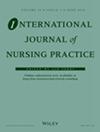Relationships Between Nurses' Personal and Professional Characteristics and Career Decision Regret, Occupational Stress and Turnover Intention: A Descriptive Cross-Sectional Study
Abstract
Aims
This study aimed to (a) examine the relationship between perceived career decision regret and turnover intention among nurses and (b) explore the mediating role of occupational stress and career decision regret in this relationship within the context of hospital-based nursing practice.
Design
A descriptive cross-sectional study.
Methods
Data were collected between 1 November 2023 and 20 February 2024, from a final sample of 512 nurses employed across various hospital settings in Türkiye. Standardized questionnaires measured career decision regret, occupational stress and turnover intention. Ethical approval was obtained from the institutional ethics committee, and informed consent was obtained from all participants. Group comparisons were performed using independent samples t tests and one-way analysis of variance (ANOVA). Pearson correlation analysis assessed relationships between continuous variables. The mediating effect of occupational stress was evaluated using the bootstrap method at a 95% confidence interval, with statistical significance set at p < 0.05.
Results
Nurses working in public hospitals reported significantly higher levels of occupational stress, career decision regret and turnover intention compared to those in private hospitals. Career decision regret had a direct positive effect on turnover intention (β = 0.37) and an indirect effect mediated by occupational stress (β = 0.33).
Conclusion
Career decision regret directly and positively influences turnover intention, with occupational stress serving as a significant mediator. These results have important implications for the development of targeted interventions aimed at reducing occupational stress, particularly among nurses experiencing career decision regret, to improve retention and reduce turnover intentions.
Reporting Method
This study adhered to the STROBE guidelines.
Patient or Public Contribution
There was no patient or public involvement in this study.


 求助内容:
求助内容: 应助结果提醒方式:
应助结果提醒方式:


